This blog was updated on 12th February 2026 to provide the latest information on Omega 3 deficiency symptoms in Vegans.
Introduction
At the beginning of my vegan journey, I believed I had it all figured out. I swapped milk for almond milk, loaded up my plate with vegetables, and prided myself on not living cruelly. But after a few months, I started noticing weird things—my skin was dry, I had trouble concentrating, and I was always tired. At first, I thought it was work and stress. But it turned out there was something else: Omega 3 deficiency symptoms in vegans are real, and they come on slowly.
If you’re vegan (or thinking of becoming one), this blog is for you. In it, we’ll learn what omega-3s are, what omega 3 deficiency symptoms are, who’s at risk, and—most importantly—how to fix them without taking fish oil.
“Good health doesn’t start when we fall sick — it starts when we listen to our body before it’s too late.”
What is omega-3 and why do vegans need them?
Omega-3 fatty acids are essential—but the body can’t make enough of them, even though they’re essential. That means they must be taken from food. There are three main classes of these:
- Alpha-linolenic acid (ALA) — found in flaxseeds, chia seeds and walnuts.
- Eicosapentaenoic acid (EPA) — mostly from algae and fish
- Docosahexaenoic acid, or DHA, is essential for eyes, brain and algae
ALA is only found in plants, but EPA and DHA are only found in fish or algae, which is a problem for vegans. The body has very little ability to convert ALA into DHA and EPA. This is why omega 3 deficiency symptoms are common in vegans.
So, what is the effect on the body when this deficiency occurs? Let’s find out.
Common symptoms of omega-3 deficiency in vegans
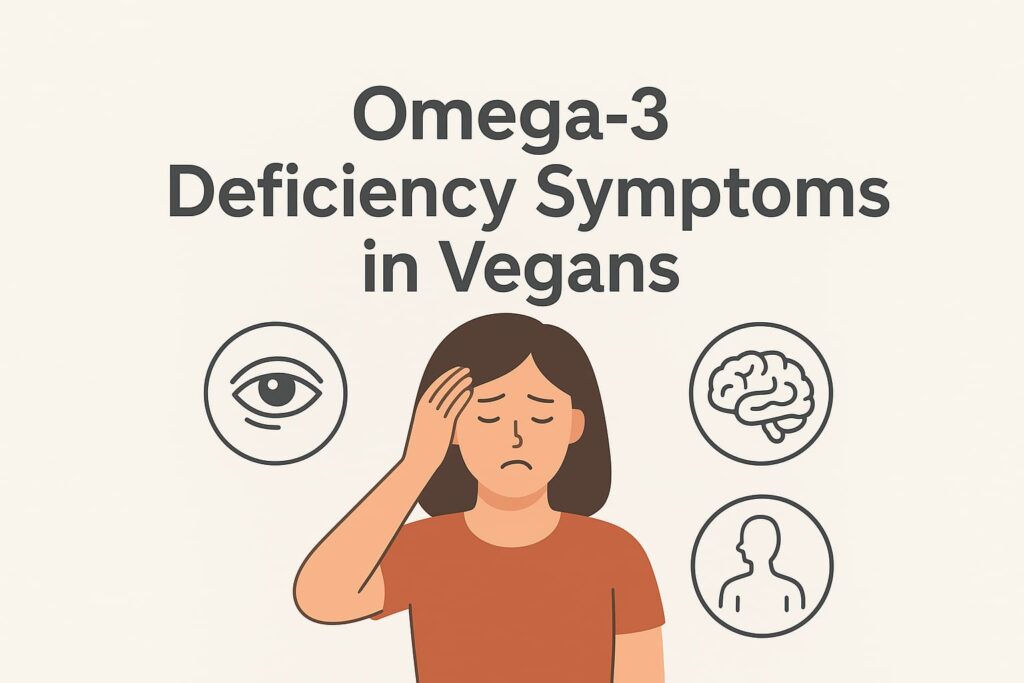
You will be surprised that these symptoms affect the body in many different ways. Omega-3 supports everything from healthy skin to sharp brain function. The effect of deficiency is visible everywhere.
Here is the most common omega 3 deficiency symptoms in vegans:
1. Lack of attention and brain fog
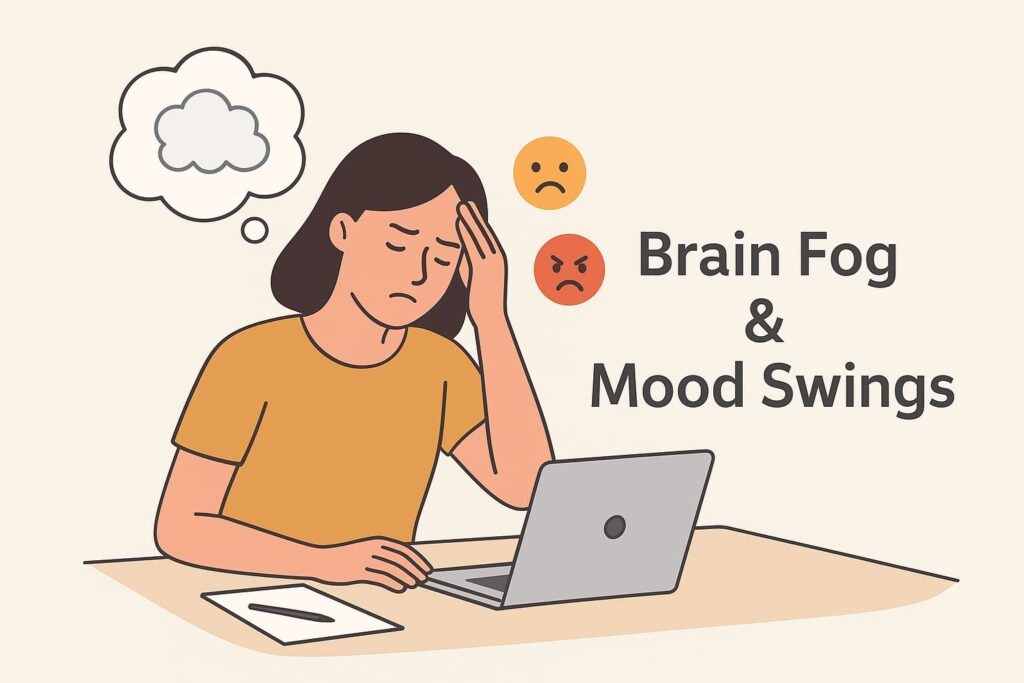
Ever step into a room and suddenly forget what you were looking for? This happens to everyone quite often, but too often can be a sign of a deficiency. Many vegans report that they have difficulty concentrating.
2. Mood swings, anxiety or depression
Omega-3 acts like oil on your brain. Neurotransmitters do not work properly without it. New research suggests that having low omega-3 levels may raise the risk of anxiety and depression. This is also one of the omega 3 deficiency symptoms in vegans.
3. Dry hair and skin
So that the skin cells remain hydrated and healthy, they need healthy fats. If there is a deficiency, the skin may become dry, itchy, dandruff may occur or there may be a problem of hair loss.
This can also be a sign of omega 3 deficiency symptoms in vegans.
4. Vision and dry eye problems
DHA is the largest fat in the retina. Symptoms of fat-free people also include dry eyes, quick fatigue or blurriness.
5. Joint swelling and pain
Omega-3 in the body reduces inflammation. Joint weakness can cause joint pain, stiffness or slow recovery after a workout. This also explains the symptoms of omega 3 deficiency in vegans.
6. Fatigue and lack of energy
Should I drink two cups of coffee in the morning to wake up? A lack of omega-3 may lead to tiredness and reduced stamina. Symptoms of omega 3 deficiency are very common in vegans.
7. Slow recovery after exercise
Omega-3 deficiency can be the reason if you go to the gym or walk but the muscles ache for several days. This is also a symptom of omega 3 deficiency in vegans.
👉 Importantly, these symptoms can be caused by other reasons. But being vegan should not ignore the symptoms of omega 3 deficiency.
👉The U.S. National Institutes of Health has also shared a detailed fact sheet on omega-3 fatty acids, including symptoms, dosage, and benefits:
https://ods.od.nih.gov/factsheets/Omega3FattyAcids-Consumer/
Omega-3 Deficiency Severity Levels
Not all symptoms appear at once. Deficiency often develops gradually.
🟢 Mild Signs (Early Warning)
- Dry or dull skin
- Occasional brain fog
- Reduced focus
- Mild fatigue
- Slight mood fluctuations
🟠 Moderate Signs (Deficiency Progressing)
- Frequent brain fog
- Poor memory recall
- Difficulty concentrating
- Increased inflammation
- Joint discomfort
- Dry eyes
🔴 Severe Signs (Long-Term Deficiency)
- Persistent cognitive fatigue
- Chronic inflammation
- Mood instability
- Poor recovery
- Noticeable memory issues
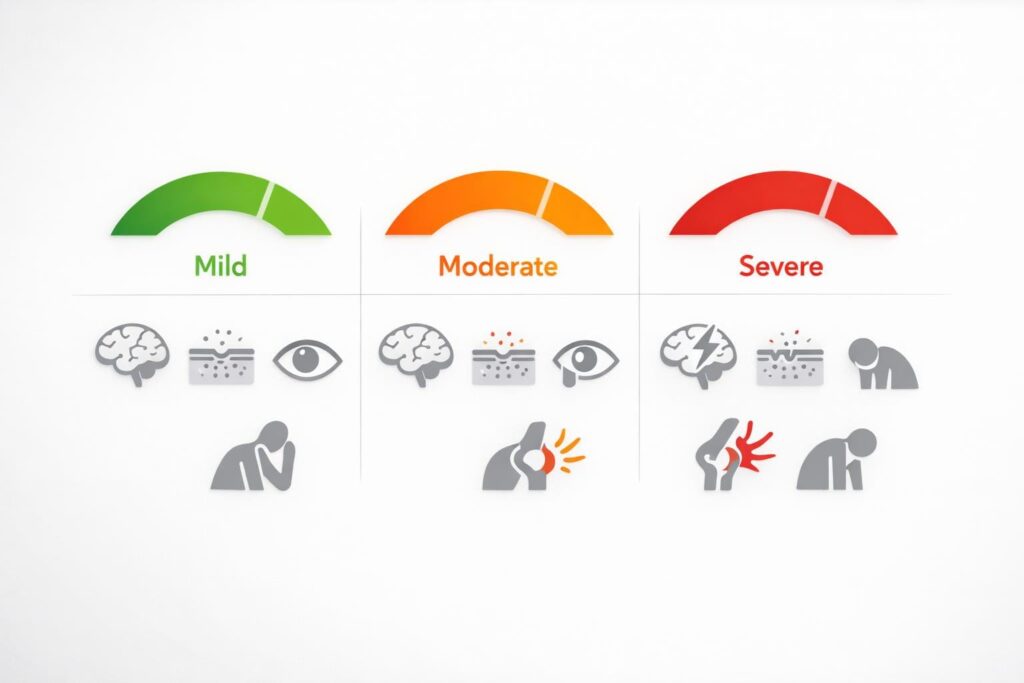
How to Fix Omega-3 Deficiency
✅ Add Direct DHA Source
Best vegan option:
✔ Algal Oil DHA
Why?
- Direct absorption
- No conversion problem
- Reliable dosage
✅ Support Absorption
- Maintain healthy fat intake
- Avoid ultra-low-fat diets
- Ensure B12 adequacy
✅ Stay Consistent
Daily DHA intake matters more than occasional use.
Which vegans are at higher risk?
Not every vegan is at the same risk. Some individuals are at higher risk:
- Pregnant or breastfeeding women- DHA is essential for the growth of a baby’s brain and eyes, and vegans tend to show early symptoms of omega 3 deficiency.
- Children and young adults- older bodies need more nutrition, but a lack of it can affect learning and emotions. This can also increase the symptoms of omega 3 deficiency in vegans.
- Athletes and fitness enthusiasts- These need more omega 3 for recovery and more energy. Omega 3 deficiency symptoms appear more quickly on veggies.
- Older people- Adults have a reduced ability to convert ALA to EPA and DHA, which makes vegans more likely to show symptoms of omega 3 deficiency.
How to make up for omega 3 deficiency in a vegan diet?
The good news is that you don’t have to eat fish. Vegans can also get enough omega-3s and avoid omega 3 deficiency symptoms in vegans.
1. ALA from plants
Start with nuts and seeds. Eat them every day:
- Flax seeds- add to oatmeal or smoothies.
- Chia seeds- add to water and drink or make chia pudding.
- Walnut- A handful of walnuts for breakfast.
- Hemp seeds- sprinkle on rice or salad
These foods are easy to include and provide ALA, which your body can partially convert into EPA and DHA.
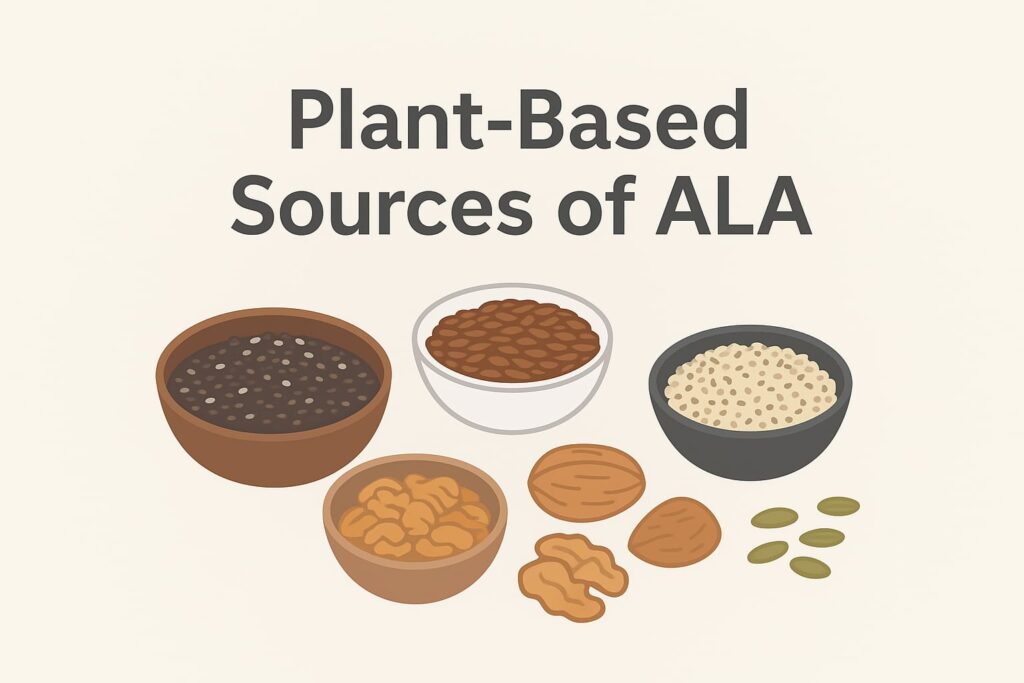
2. Veggie DHA and EPA oil supplements
This is the real game-changer. Fish also contains omega-3 algae. So why not get it directly from the sources? You get DHA and EPA directly from algae oil supplements, which can help you avoid omega 3 deficiency symptoms in vegans.
👉For vegan-specific advice on getting enough omega-3, The Vegan Society offers practical guidance and tips here:
https://www.vegansociety.com/resources/nutrition-and-health/nutrients/omega-3
Fish oil isn’t the only solution. Vegans can get the same benefits directly from algae oil. If you’re in India, one reliable option is the WOW Life Science Vegan Omega-3 Capsules, made with pure plant-based algae oil.
👉 Buy WOW Vegan Omega-3 on Amazon.in https://amzn.to/3IbDcfM
3. Balance between omega-6 and omega-3
When people eat more omega-6s, like corn oil, sunflower oil, and fried foods, their omega-3 exposure is reduced.
Reduce processed oils.
Use olive oil or avocado oil.
Eat whole grains and fresh food instead of packed snacks.
This can prevent omega 3 deficiency symptoms in vegans.
4. Daily routine tips
Boost your breakfast smoothie with flaxseed powder.
Have a walnut snack in the afternoon.
Use refined oil instead of hemp oil.
Algae oil capsules should be taken every day. These small steps keep you away from omega 3 deficiency symptoms in vegans.
Prevention and long-term health tips
What matters is not just fixing the deficiency, but also making sure it doesn’t come back. For this:
- Always keep omega-3 rich foods on your grocery list.
- Pregnant women, breastfeeding mothers and children must take algae supplements to avoid omega 3 deficiency symptoms in vegans.
- Pay attention to your symptoms—check your intake if fatigue, moodiness, or skin problems return.
- Get a blood test if you have the chance, especially if you are a strict vegan.
The benefits will pay off in the long run—better moods, a sharper mind, a stronger heart, and healthier skin, and you will avoid omega 3 deficiency symptoms in vegans.
👉If you want to dive deeper into the science behind omega-3 fats and their role in health, Harvard’s public health resource is a great place to start:
FAQs (Questions and Answers)
- What are the first symptoms of a vegan’s omega-3 deficiency?
👉The first signs may show up as weak hair, dry skin, mood changes, brain fog, and constant tiredness. If you are vegan and experiencing more than one of these symptoms at once, it could be due to an omega-3 deficiency.
- Can vegans get enough omega-3 fatty acids without taking supplements?
👉Yes, but it’s difficult. Foods like hemp seeds, walnuts, flaxseeds, and chia seeds contain ALA. However, because their bodies only convert a small amount into DHA and EPA, many vegans continue to experience symptoms of omega-3 deficiency over time.
- For vegans, what is the best source of DHA?
👉Supplements containing algae oil are the best source. Vegans can bypass fish and get their omega-3 straight from the source—pure, sustainable, and entirely plant-based—because fish get it from algae.
- How long does a vegan diet take to correct omega-3 deficiency?
👉How low your levels are will determine this. Within four to eight weeks of taking chia, flax, walnuts, and algae oil capsules on a daily basis, most people begin to notice improvements in their energy, mood, and skin.
- Are omega-3 supplements safe for long-term use?
👉Yes. Algae-based omega-3 supplements are safe, well-researched, and ideal for vegans. They can be taken long-term without side effects, making them a reliable solution to prevent omega3 deficiency symptoms in vegans.
6. Is vegan DHA effective?
👉Yes. DHA molecule identical.
Climax
Being vegan is not a health hazard. Most people assume there will be a deficiency, but that is not the case. You can reap the full benefits of a plant-based lifestyle if you understand and prevent omega 3 deficiency symptoms.
Last thing? Listen to your body. If fatigue, lack of concentration, or skin problems show up, don’t ignore it. With the right foods and perhaps an algae oil supplement, you can easily reverse omega 3 deficiency symptoms in vegans.
Your vegan journey shouldn’t just be about surviving; it should be about thriving. With omega-3s, vegans won’t see omega-3 deficiency symptoms.
Omega-3 deficiency in vegans is not rare – it is predictable.
Fortunately, correction is straightforward.
With a direct DHA source and consistent intake, recovery becomes efficient.
I wish someone had told me earlier – most vegans don’t lack protein, they lack DHA. The moment I fixed this, everything changed.
👉If you’re already looking for a trusted supplement, you can try RASAYANAM Vegan Omega-3 DHA available on Amazon.in https://amzn.to/4niaV6f
Get more information about Vegan DHA from our other blogs. Blog
Once you start supplementing, here’s how long vegan DHA takes to work…
Disclaimer: This post contains affiliate links. If you buy through these links, I may earn a small commission at no extra cost to you. It helps me keep sharing useful content with you.
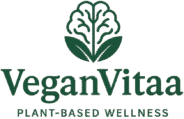
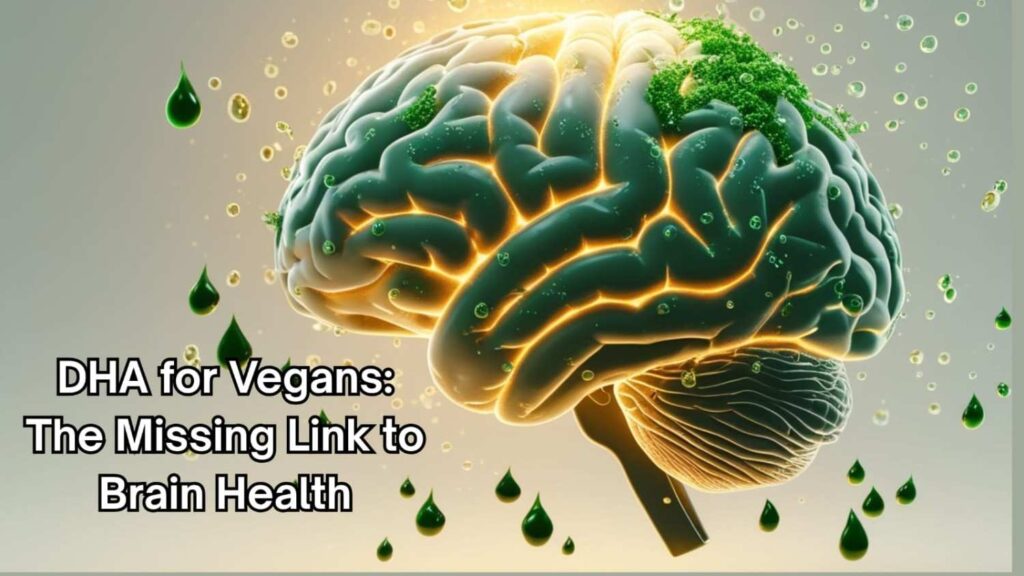
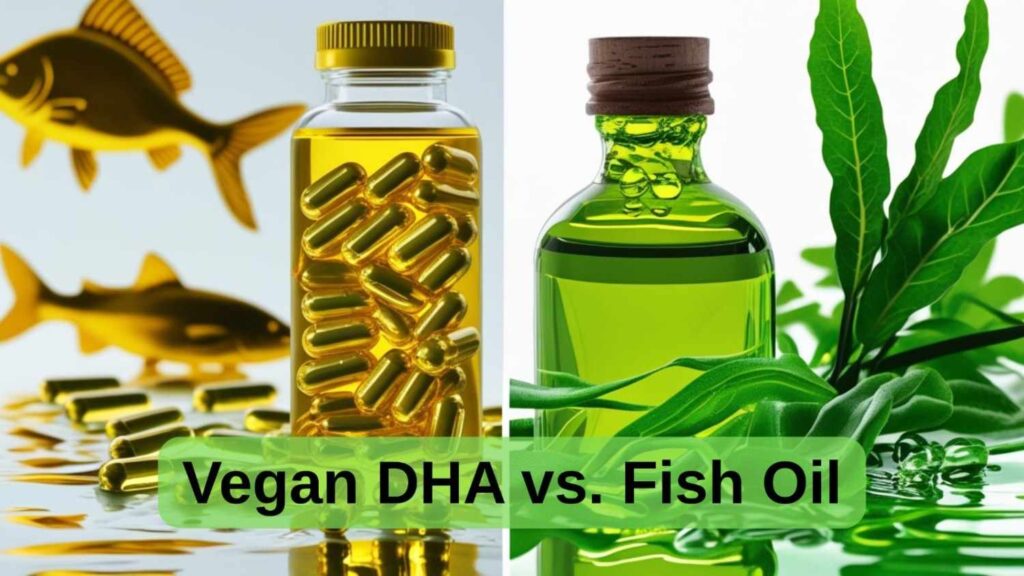
Pingback: Vegan DHA for Mental Health: Natural Support for Depression
Pingback: Omega-3 Deficiency Symptoms in Vegans: 7 warning signs
Pingback: Omega-3 for Anxiety, Stress & Depression: What Science Says
Pingback: 5 Subtle Signs You’re Not Getting Enough Omega 3
Pingback: Vegan DHA for Seniors: Boost Memory, Vision & Joint Health
Pingback: DHA Deficiency Symptoms: 7 Hidden Signs You Must Know
Pingback: How much Omega 3 do you really need daily- Simple guide
Pingback: Best Time to Take Vegan Omega 3 for Anxiety
Pingback: Algal Oil DHA vs Flaxseed Omega 3: Which Truly Works?
Pingback: Vegan DHA Results After 30 Days: Energy & Focus Case Study
Pingback: Vegan Omega 3 for Kids: Brain Growth, Memory & Focus Guide